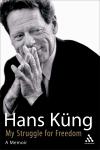Catholic theologian and philosophy scholar Hans Kung was voted by the members and visitors of Universe Spirit as our October Philosopher Artist of the month.
 Hans Küng was born on March 19, 1928, in Sursee, Switzerland. After graduating from the state gymnasium in Lucerne, he attended the Pontifical German College and the Gregorian University in Rome. He was ordained a Roman Catholic priest in 1954 and continued his studies in theology at the Institut Catholique at the Sorbonne in Paris. In 1960 he was appointed professor of fundamental theology at the University of Tübingen in Germany. In 1962 he was appointed by Pope John XXIII an official theologian (peritus) at the Second Vatican Council. Following the Council, he continued to teach at Tübingen.
Hans Küng was born on March 19, 1928, in Sursee, Switzerland. After graduating from the state gymnasium in Lucerne, he attended the Pontifical German College and the Gregorian University in Rome. He was ordained a Roman Catholic priest in 1954 and continued his studies in theology at the Institut Catholique at the Sorbonne in Paris. In 1960 he was appointed professor of fundamental theology at the University of Tübingen in Germany. In 1962 he was appointed by Pope John XXIII an official theologian (peritus) at the Second Vatican Council. Following the Council, he continued to teach at Tübingen.
Küng's doctoral dissertation was on Karl Barth's theory of justification and its relationship to traditional Roman Catholic understanding. That work, published in English as Justification: The Doctrine of Karl Barth and a Catholic Reflection (1964), is an example of Küng's interest in the reconciliation of separated Christian churches. Combining careful analyses of the Barthian and present-day Roman Catholic views along with an indication of their development from the time of the Reformation, the book indicates that contemporary differences stem from different ways of talking rather than from substantive disagreement.
Unlike other contemporary Roman Catholic theologians such as Karl Rahner or Bernard Lonergan, Küng did not develop a definite metaphysical position on which to base his views. Rather, his thought comes from studies of church and theological history plus an awareness of the strong contemporary drive for freedom of thought and the concurrent antagonism to authoritarian institutional structures. In many of his works (such as The Council, Reform, and Reunion, 1962, and Structures of the Church, 1964) Küng combined historical analysis with reflection upon contemporary problems to indicate the need for reform within the Roman Catholic Church and the real possibility of reconciliation with other churches.
After the Second Vatican Council, Küng continued to write on the need for reform with special emphasis on the concept of service and ministry (The Church, 1968) and the changes that must occur in the day-to-day administration of the Roman Catholic Church (Truthfulness: On the Future of the Church, 1968). In Infallible: An Enquiry (1971) he traces the development at the First and Second Vatican Councils of the present official understanding of papal and Episcopal infallibility and questions whether this official view is not distorted in the light of both biblical teaching and contemporary philosophy. In 1998, Kung published A Global Ethic for Global Politics and Economics. In it he argues the need for a global ethic in the next century to which all nations and peoples would subscribe.
Küng's views on such traditional doctrine as the divinity of Christ, papal infallibility, and the dogma of the Virgin Mary helped to bring about his censorship by the Vatican in 1979. He was banned from teaching as a Catholic theologian, which provoked international controversy. An agreement of sorts was reached in 1980 that allows Küng to continue teaching at Tübingen under secular rather than Catholic auspices. He is now professor emeritus of Tübingen University.
See the Santa Clara University website below for a recent interview with Kung:
http://www.scu.edu/scm/summer2005/kung.cfm
Books:
- A Global Ethic: The Declaration of the Parliament of the World's Religions
- The Catholic Church : A Short History (Modern Library Chronicles)
- On Being a Christian
- My Struggle for Freedom: Memoirs
- Great Christian Thinkers
- Christianity: Essence, History, and Future
- Does God Exist?: An Answer for Today
- Justification: The Doctrine of Karl Barth and a Catholic Reflection
- A Global Ethic for Global Politics and Economics
- Theology for the Third Millennium: An Ecumenical View by Kung, Hans
- Why I Am Still a Christian
- Infallible?: An inquiry
- Literature & Religion: Pascal, Gryphius, Lessing, Holderlin, Novalis, Kierkegaard, Dostoyevsky, Kafka
- The Rivers of Paradise: Moses, Buddha, Confucius, Jesus and Muhammad As Religious Founders
- Christianity and World Religions: Paths of Dialogue With Islam, Hinduism, and Buddhism
- Judaism: Between Yesterday and Tomorrow (Judaism)
- Eternal Life?: Life After Death as a Medical, Philosophical, and Theological Problem
- Tracing the Way: Spiritual Dimensions of the World Religions
- Women In Christianity (Continuum Icons)
- My Struggle for Freedom : A Memoir
- The Peace Bible: Words from the Great Traditions
- Paradigm Change in Theology
- Reforming the Church Today: Keeping Hope Alive
- Dying With Dignity: A Plea for Personal Responsibility
- Global Ethic and Global Responsibilities: Two Declarations
- Dialogue with Hans Kung
- Fundamentalism as an Ecumenical Challenge: A Concilium Special
- Yes to a Global Ethic
- A Dignified Dying
- Christianity: Its Essence and History
- Infallible?: An Unresolved Enquiry
- Christianity and Chinese Religions
- CREDO
- Mozart: Traces of Transcendence
For more details on the Global Ethic Foundation please visit: http://www.weltethos.org and click on flag in left hand corner to translate to another language, if necessary.
You can also view the text of the Global Ethic adopted at the Parliament of World’s Religions 1993 by visiting: http://www.weltethos.org/dat_eng/index5_e.htm

